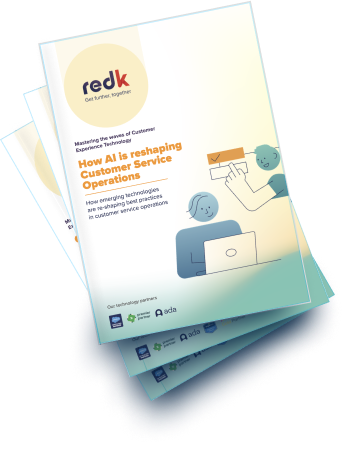The redk team had the pleasure of collaborating with the DEC Association in Spain on a webinar titled: 5 Key Ways to Create a Positive Impact on Your Customers with Artificial Intelligence. We explored how AI is changing the rules of CX and how that impacts your wider business.
In this blog, we share the experiences and tips shared by our panel of experts.
The importance of AI in CX
AI is not just a technology trend; it’s a strategy that puts the customer at the heart of service. The experts in our webinar shared their experiences and told us how AI not only solves problems but creates unforgettable experiences.
Consumer expectations have changed, and now there is demand for faster, more personalised solutions. Did you know that 72% of consumers expect immediate responses from companies? And 70% consume more from companies that offer continuous conversational experiences?
The risks of AI in CX
Technological revolutions entail certain risks that must be addressed to ensure an optimal customer experience (CX).
Customer Privacy
Customer privacy is a paramount concern in the digital age. With AI processing large amounts of personal data, there is a risk that this information can be misused.
AI facilitates processes, but when personal data is involved, it has to be supervised by people.
Inma Costa, Executive at Consum Cooperativa Valenciana
Companies using AI-based recommender systems should ensure that these systems do not share specific details about customer preferences without explicit consent.
Trust in AI
Trust is fundamental to any relationship, including the relationship between a company and its customers. If customers feel that AI is untrustworthy or that its decisions are not transparent, this can erode trust in the brand.
Ezequiel Martínez Barros, Customer Service Manager at Wallapop, gave us some key insights: “Trust in AI depends on the context in which it is used and the level of trust that each company wants to give. For me, it is a tool that has great potential, but you have to understand the algorithm to develop it”.
Alberto Becerra, Regional Sales Director EMEA at Zendesk, highlighted: “Working well with a brand is based on trust, not on technology”.
If an AI-based chatbot provides incorrect or misleading information to a customer, this can lead to a loss of trust not only in the tool but in the company as a whole.
Systematic approach
AI is constantly evolving, and falling behind is a very real risk for businesses. Customers demand security, convenience and the best service with the latest technology. This is precisely why it is advisable to avoid improvisation and adopt a systematic approach that allows you to always be up-to-date without losing the flexibility and adaptability needed to address individual customer needs.
We need a systematic approach that helps us to minimise the risks that customers are perceiving, on the one hand, and on the other hand, that sets out a roadmap that allows us to catch up in the use of these technologies.
Miguel Magán, General Manager of redk Spain
Best practices of AI in CX
Successful implementation of AI in CX requires a combination of technology, strategy and a customer-centric approach. Here are the best practices mentioned in our webinar:
Conversational Approach
Customers expect a conversational experience with brands, preferably asynchronously. This means they want to interact through chats, WhatsApp and other means where they can receive quick responses but not necessarily in real-time.
Omni-channel
More than multiple communication channels are needed; these channels must be integrated to provide a seamless customer experience. For example, a customer could start a conversation in a chat room and continue it on WhatsApp without repeating information.
Personalisation
Customers expect companies to know them and understand their needs. This means using data and analytics to deliver a more personalised experience.
Tool integration
Companies are adopting a variety of technology tools to improve CX. However, these tools must be well-integrated and focused on putting the customer at the centre of the experience.
Privacy and security
With the increased use of AI, there are also concerns about the privacy and security of customer data. Companies need to ensure that data is protected and used ethically.
Strategic adoption of AI
AI should not be merely a tactical solution. Companies must have a strategic vision and a dedicated team to implement and manage AI-based solutions.
Continuous evaluation
Companies must continually evaluate the tools and strategies they use, ensuring they are aligned with changing customer needs and expectations.
Predictive proactivity
Using AI to anticipate customer needs before they arise, based on historical and other data.
Sentiment analysis
Use AI tools to analyse customer sentiment and adapt interactions accordingly.
In conclusion, AI offers exciting opportunities to revolutionise CX, but it is essential to address the risks and adopt best practices to ensure success. With the right approach and strategy, companies can leverage AI to deliver exceptional customer experiences and stand out in today’s competitive marketplace.

To learn more about how AI is reshaping customer service operations, check out our in-depth report here.










